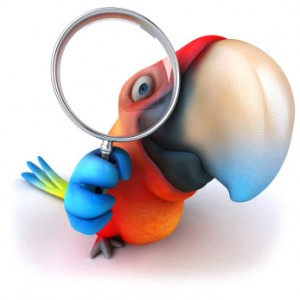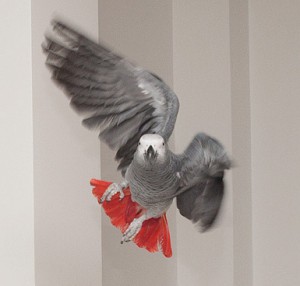 We’ve all seen stories about a family’s dog or cat running off and being found months or even years later — sometimes hundreds of miles from home. But what about wayward companion birds? Most of those lost canines and cats were reunited because they still had their identification tag on, or they were microchipped. Of course pet parrots don’t wear dog- or cat-type collars, and the average person wouldn’t know how to read a bird’s leg band. Still, far fewer pet parrots are microchipped and, as a result, there are far less happy reunions. Which makes the story of Nigel the African grey parrot a great example of what a microchip can do.
We’ve all seen stories about a family’s dog or cat running off and being found months or even years later — sometimes hundreds of miles from home. But what about wayward companion birds? Most of those lost canines and cats were reunited because they still had their identification tag on, or they were microchipped. Of course pet parrots don’t wear dog- or cat-type collars, and the average person wouldn’t know how to read a bird’s leg band. Still, far fewer pet parrots are microchipped and, as a result, there are far less happy reunions. Which makes the story of Nigel the African grey parrot a great example of what a microchip can do.
Nigel’s lost-pet story certainly has news reporting agencies from around the globe talking lately. Nigel lived in Southern California with his British-born owner, Darren Chick and so, being an African grey, he naturally mimicked Chick’s British accent. That was until Nigel flew away in 2010. Fast forward to October 2014 when the owners of dog spa had a parrot that matched a lost-bird ad placed by Teresa Micco, a veterinarian. The bird wasn’t the grey Micco was looking for; however, the veterinarian was able to track Nigel back to the pet store was he was purchased at, and not long after, Micco was knocking on Chick’s door with Nigel in hand.
The story’s twist isn’t that Nigel was gone for four years — it was picked up by news outlets because Nigel came back to Chick speaking Spanish, apparently having ditched his British brogue. To non-parrot people, this must seem like quite a transformation … like a lost dog returning home after a few years on the lam meowing like a cat. But most bird enthusiasts can imagine a scenario in which Nigel was in the company of people who spoke Spanish, either directly to him or in the environment around him. African grey parrots seem especially adept at absorbing the words, phrases and sounds they are exposed to. The twist I am waiting to see is if Nigel goes back to speaking like a Brit, if he sticks to Spanish or if he creates his own version of “Spanglish.”
Yet another twist in Nigel’s story. Not long after his reunion with his wayward grey, Darren Chick — Nigel’s original owner made the decision to give Nigel back to the family that had kept the grey parrot for the four years he was missing. According to a story run in the Torrance Daily Breeze, a couple bought the bird, which they named Morgan, at a garage sale for $400. Liza Smith, said Morgan learned Spanish from her Guatemalan-born grandfather, Ruben Hernandez, 86. “We’re just over the moon,” Smith told the newspaper, who added that the bird had become a special friend to her grandfather, especially in the two years since he lost his wife, who used to whistle tunes to the bird. What would you do if your bird went missing and ended up living with another family he or she bonded with … did Chick make the right call?

About That Chip
Back to microchipping … without that chip, Nigel might never had made it back home. While leg bands can and do facilitate reunions, not all are accurately read, and they can fall off or be removed by someone looking to make a buck off of a pilfered parrot. Microchips, which are about the size of a grain of rice and placed in the bird’s breast muscle, offer permanent and positive identification. They are typically placed in parrots weighing more than 100 grams, e.g. conure-size and on up. (Check with your avian vet to see if microchipping is a good option for your pet bird.) In order for a microchip to be affective, a found pet must be brought to a veterinarian’s office or animal shelter to be scanned. If your bird has a microchip, make sure your contact information is up to date. According to the APPA 2010 National Pet Owner Survey, more than half of microchipped pets have outdated owner information.





